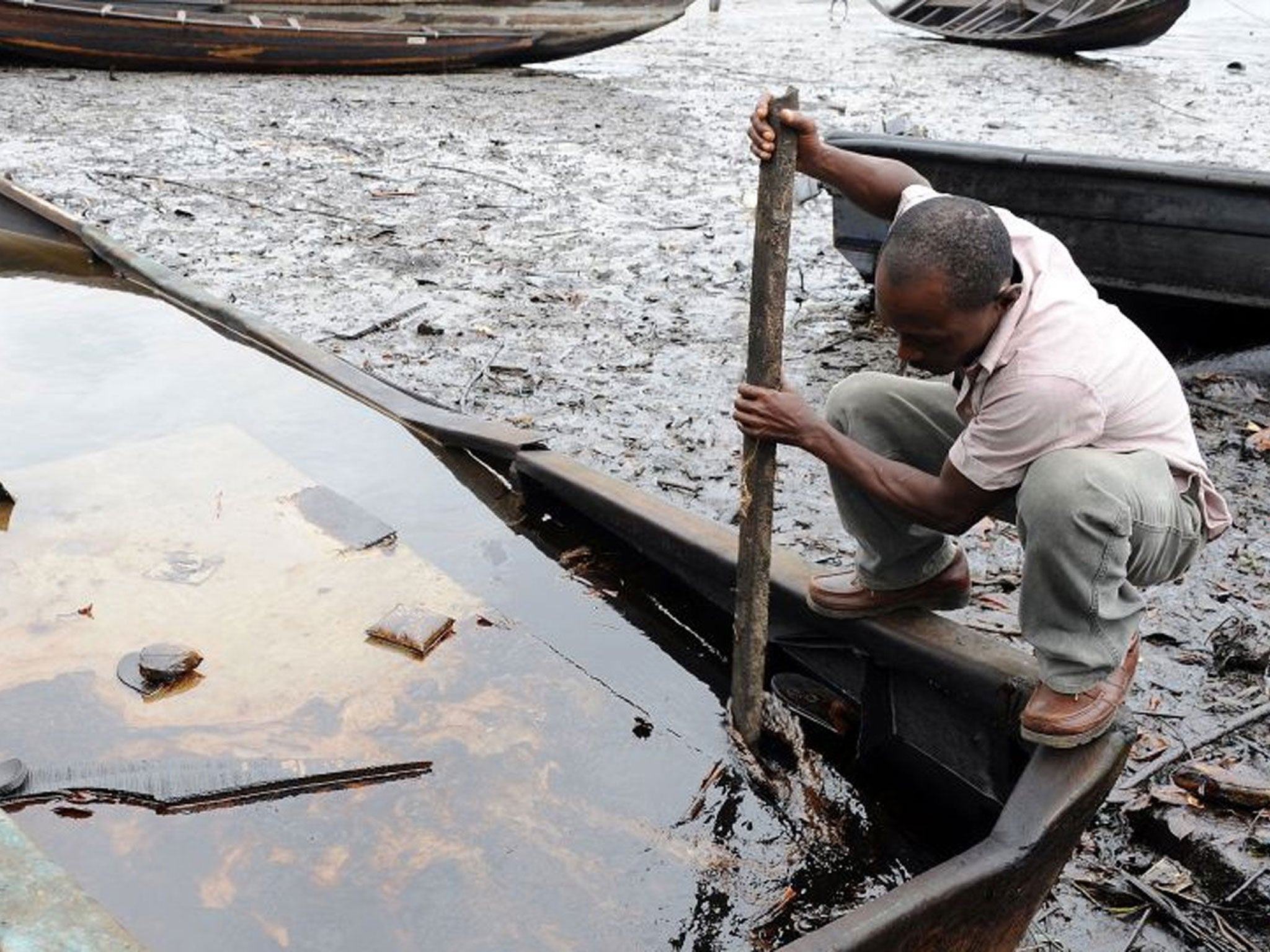Shell close to deal over 'ruinous' oil spill in Niger Delta
Five years after fishing and farming livelihoods were ruined, oil giant is ready to agree compensation which could reach £100m

Your support helps us to tell the story
From reproductive rights to climate change to Big Tech, The Independent is on the ground when the story is developing. Whether it's investigating the financials of Elon Musk's pro-Trump PAC or producing our latest documentary, 'The A Word', which shines a light on the American women fighting for reproductive rights, we know how important it is to parse out the facts from the messaging.
At such a critical moment in US history, we need reporters on the ground. Your donation allows us to keep sending journalists to speak to both sides of the story.
The Independent is trusted by Americans across the entire political spectrum. And unlike many other quality news outlets, we choose not to lock Americans out of our reporting and analysis with paywalls. We believe quality journalism should be available to everyone, paid for by those who can afford it.
Your support makes all the difference.For five years a London law firm and Anglo-Dutch oil giant have argued over reparations for one of the world's worst spills in Africa's oil heartland. But now, as fishing villages on the banks of the Niger Delta continue to count the cost of the leaks, compensation claims are finally due to be settled.
Royal Dutch Shell will tomorrow seek to reach an "acceptable agreement" with inhabitants of the cluster of Nigerian fishing villages over claims their livelihoods were ruined by the spills in 2008.
The compensation talks, which could reportedly cost Shell £100m, start in Port Harcourt – the capital of Nigeria's southern Rivers state and the centre of Africa's oil industry. Should a multimillion-pound settlement be reached, it could set a precedent for payouts in developing, but oil rich, nations.
Some 15,000 residents of the villages in the Bodo community are seeking compensation. The London law firm Leigh Day, which is representing the Nigerians, estimates that up to 600,000 barrels was spilled into the waters over 100 days.
Shell disputes that figure and the amount of damage caused, but admitted liability in 2011 for the spills. The oil firm estimates that 4,100 barrels were leaked.
According to the United Nations, the spill left at least 10 Ogoni communities with drinking water contaminated by "high levels of hydrocarbons" and the public health "seriously threatened". In Nisisioken Ogale, in western Ogoniland, people were drinking water from wells contaminated with benzene at levels 900 times those of World Health Organisation guidelines.
"The oil industry has been a key sector of the Nigerian economy for over 50 years, but many Nigerians have paid a high price," said Achim Steiner, the UN environment programme executive director, in 2011.
But two years after the UN said trust needed to be built and action taken to remedy the "multiple health and sustainable development issues", no agreement has been reached. Shell said there was a "very limited" chance of a resolution as recently as last month. But on Friday a spokesman was more positive. "We're hopeful that an acceptable agreement can be reached with the Bodo during next week's negotiations."
Leigh Day's position that "no clean-up work has begun" is disputed by Shell. According to Leigh Day, much of the oil that leaked into waterways around the Bodo and Niger Delta is yet to be cleared.
The Nigerians' lawyer, Martyn Day, last week described Shell's clean-up efforts as "pitiful". He said some 1,000 hectares of mangrove swamps were destroyed and another 5,000 hectares affected. Mr Day said: "We will be doing our damnedest to ensure Shell pays out a fair amount for the damage they have caused, and put the Bodo Creek back into its pre-spill state." He added: "It is entirely depressing that one of the largest companies in the world is acting like the playground bully, trying to batter local people, whose lives have been devastated, into submission."
Shell said it hoped a deal would be reached to provide "fair compensation, as well as a way forward on cleaning up the entire area affected by oil spills". The oil company, which described the 2008 spills as "highly regrettable" and blamed corrosion to a pipeline, said it sought "resolution, not recrimination" tomorrow.
The Nigerian environmentalist and activist Nnimmo Bassey welcomed the talks, but added that Shell needed to clean up the spill. "More important is a clean-up of the mess, the pollution, so that the fishermen and farmers can have their means of livelihood back," he said.
Join our commenting forum
Join thought-provoking conversations, follow other Independent readers and see their replies
Comments